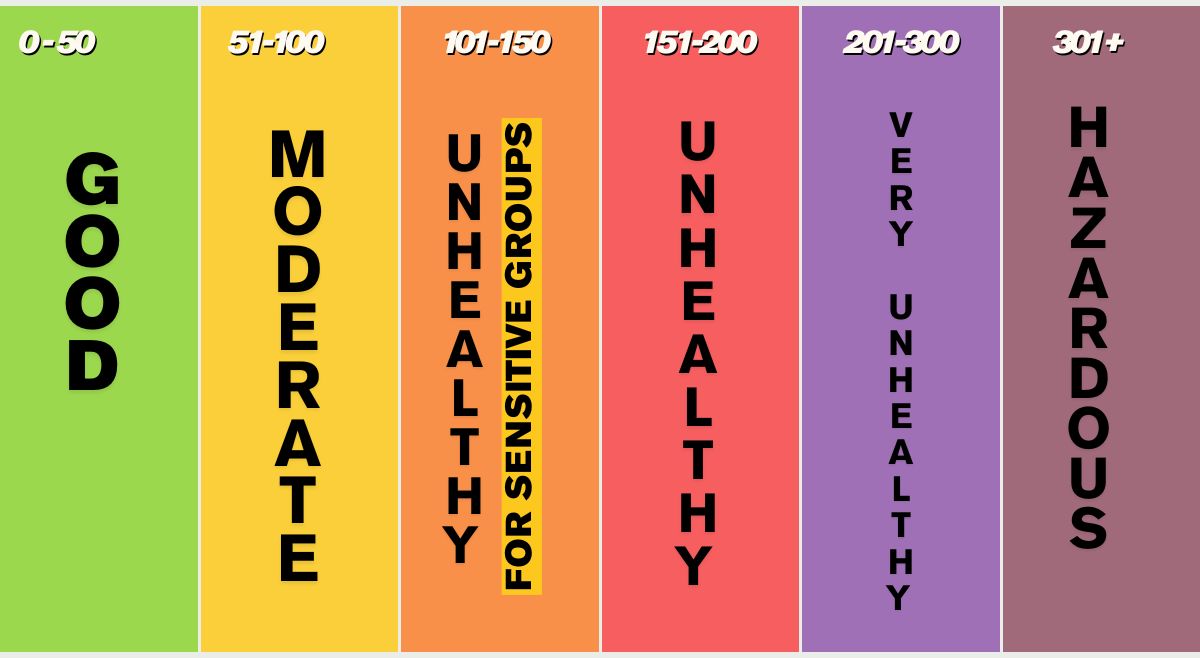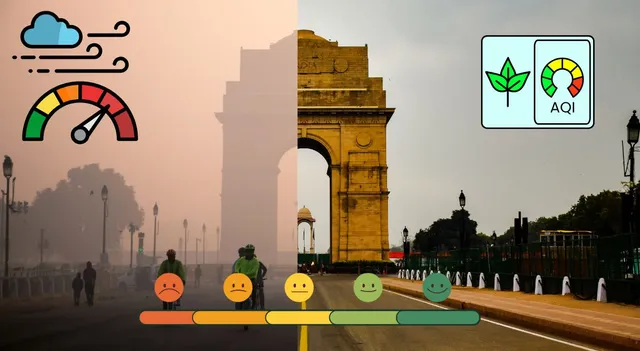- By Ridam Sharma
- Tue, 14 Oct 2025 12:13 PM (IST)
- Source:JND
Most Polluted Cities: As the world gears up for Diwali in late October 2025, air quality concerns have reached alarming levels, especially in South Asian cities. Additionally, based on the recent global air quality rankings, three Indian cities are also on the list of the top 10 most polluted cities in the world, with concerning AQI rankings. The alarmingly high AQI scores highlight a worsening environmental crisis, mainly due to festive seasons, urbanisation, and industrial waste. To learn more, here is the list of the top 10 most polluted cities in the world, along with their alarming AQI scores.

AQI Ranking System; Category-Wise Score ( Image Credit: The Daily Jagran)
List Of Top 10 Most Polluted Cities In The World 2025:
| Rank | City, Country | AQI (US) |
|---|---|---|
| 1 | Lahore, Pakistan | 234 |
| 2 | Delhi, India | 193 |
| 3 | Kuwait City, Kuwait | 185 |
| 4 | Kolkata, India | 168 |
| 5 | Doha, Qatar | 162 |
| 6 | Dhaka, Bangladesh | 158 |
| 7 | Kinshasa, DRC | 157 |
| 8 | Milano, Italy | 155 |
| 9 | Mumbai, India | 155 |
| 10 | Karachi, Pakistan | 152 |
Source: Live AQI has been recorded as of October 14, 2025 (Tuesday) – 11:21 IST AM – on IQAir Air Quality Rankings.
Which Are The Top 10 Most Polluted Cities In The World In 2025?
1. Lahore, Pakistan
Lahore, Pakistan, with an AQI score of 234, is the most polluted city in the world, as of October 14th, 2025. The city is in the category of ‘Hazardous’ due to constant industrial emissions, vehicular pollution, and agricultural stubble burning in neighbouring areas.
2. Delhi, India
Delhi, India, with an AQI score of 193, is the world's second-most polluted city as of October 14th, 2025. The national capital of India suffers from traffic congestion, construction dust, and crop residue burning in Punjab and Haryana. Additionally, Diwali is just around the corner, which causes the widespread use of firecrackers, resulting in deterioration of the air quality in Delhi.
3. Kuwait City, Kuwait
Kuwait is the third most polluted city in the world, with an AQI score of 185. Factors like oil refining, heavy reliance on vehicles, and desert dust storms impact the air quality here.
4. Kolkata, India
Kolkata, India, has a concerning AQI score of 168. All because of the city’s high population, old cars, and industrial activities in the region, all of which significantly worsen its air quality. Diwali celebrations also contribute to the load, with firecrackers emitting harmful chemicals and smoke.
Also Read: Smog Stories: Can Green Firecrackers Really Make Delhi’s Diwali Less Polluted?
5. Doha, Qatar
Doha, Qatar, has an AQI of 162 due to pollution challenges associated with urbanisation at a fast rate, high energy use, and intense heat that further boosts ground-level ozone.
6. Dhaka, Bangladesh
Dhaka, Bangladesh, has an AQI of 158, which is regarded as ‘Unhealthy’. The worsened air quality here is due to unregulated industries, brick kilns, and traffic congestion.
7. Kinshasa, Democratic Republic of the Congo
Kinshasa, Democratic Republic of the Congo, is the only African city on the list, with an AQI of 157. The city goes through high usage of biomass fuels, waste burning, and a lack of environmental control.
8. Milano, Italy
Milano, Italy, has registered the AQI of 155, which is also unhealthy. The major reason for the high AQI score is due to geographical trapping of pollutants in the Po Valley, especially during the winter season.
Also Read: Delhi-NCR Air Quality To Dip To 'Very Poor' Ahead Of Diwali, Ending 4-Month Clean-Air Streak
9. Mumbai, India
Mumbai, at 155 AQI, is also among the most polluted cities in the world. The city is also known as the financial capital of India. However, the pollution rise is due to construction, traffic, and burning waste. Additionally, the Diwali spikes the AQI score of the city into the ‘Unhealthy’ range.
10. Karachi, Pakistan
Karachi, Pakistan, concludes the list of the top 10 most polluted cities in the world, with an Air Quality Index of 152. The high AQI scores here are due to industrial emissions and poor waste management in the city.
With three Indian cities on the list of most polluted cities in the world, amid Diwali celebrations, it highlights the key role of sustainable celebrations across India and beyond. Eco-friendly celebrations with limited use of firecrackers and following green practices are a need of the hour.
Long-term efforts should be all about strict emission methods, improved public transport, along collaborative efforts for agricultural fires. Air quality is a worldwide issue, but seasonal festive peaks call for an urgent response.

